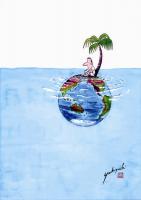 If the world succeeds in avoiding ecological collapse, historians may one day look back on 2006 as the “tipping-point” moment.
If the world succeeds in avoiding ecological collapse, historians may one day look back on 2006 as the “tipping-point” moment.
Around the globe, the past year has produced a remarkable series of indicators that human societies are waking up to the precarious state of our world. If current trends are not reversed-and soon-we will hand the next generation not only a natural resource base on the verge of collapse, but a global economy on the edge of failure.
Even though 2006 was marked by its share of acute crises, led by the conflicts in Iraq and Darfur, the less acute but more profound crisis of global climate disruption reached the top rungs of public attention for the first time. Scientists warn we may soon cross a threshold of no
return as dying forests and warming tundra release additional carbon dioxide into the atmosphere, enabling climate change to feed on itself. In fact, some believe it could already be too late.
This urgency is being reflected in public opinion. In tallying the results of 2006 elections and opinion polls in several countries, the news service Reuters adapted an old James Carville phrase, “It’s the environment, stupid.” In Europe, which has long eclipsed the United
States in such matters, even conservative parties have taken up the environmental banner. And in the pivotal U.S. mid-term elections, analysts were surprised to find that global warming played a role in many races, often at the expense of incumbents who had ignored the
problem. As a result, climate policy will be high on the agendas of both Democratic and Republican legislators in 2007.
The awakening of the United States from years of fitful hibernation is my nomination for the most momentous environmental development of the year. Without the leadership of the world’s leading superpower-and biggest polluter-it is impossible to mobilize the global consensus needed to tackle this daunting problem, or to galvanize the second and
third most important countries, China and India.
The most intriguing part of the U.S. story involves my home state of California, which in September adopted landmark legislation to limit greenhouse gas emissions. Notably, venture capitalists and SiliconValley entrepreneurs played a key role in pushing the new climate bill
through. Today, renewable energy technologies like solar power and biofuels are growing at nearly 20 times the rate of fossil fuels, and major institutions and investors like Wal-Mart, DuPont, and Goldman Sachs are channeling billions of dollars in their direction.
In the more than three decades that Worldwatch has tracked global environmental trends, there has never been a year like the one now coming to a close. We have entered a period of rapid, non-linear change, not only in our planet’s ecosystems, but in the worlds of business and
politics as well. The question now is whether humanity will continue to mobilize-before it’s too late. 2007 will provide a test of whether this incredible new momentum can be maintained.